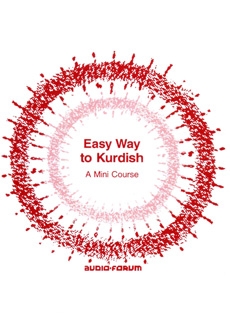| Éditeur : Compte d'auteur | Date & Lieu : 1997, Guilford - USA |
| Préface : | Pages : 60 |
| Traduction : | ISBN : 0-88432-941-0 |
| Langue : Anglais, Kurde | Format : 215x300 mm |
| Code FIKP : Liv. En. | Thème : Linguistique |
|
Présentation
|
Table des Matières | Introduction | Identité | ||
 Easy way to Kurdish, a mini course | |||||
|
Introduction Easy Way to Kurdish is a brief, basic course designed to give the beginner words, phrases, and sentences useful for everyday conversation, whether traveling or working in Kurdistan. This course is in Surani dialect which is spoken by 10 to 12 million people and can be understood by many other Kurdish speakers. The course consists of 16 units and three cassettes. While no specific order has to be followed, it is a good idea to master common phrases frequently used in questions, personal and demonstrative pronouns, numbers, etc. because most other sections will require the use of some of this information. The user is given a wide variety of frequently used sentence structures such as nominal sentences, is/are sentences, and more commonly used verbal sentences. Mastery of these structures will give the user a basis for reproducing similar structures as (s)he expands his/her vocabulary. The presentation on the cassettes, as in the book, begins with English which is fol1owed by Kurdish. After you hear the Kurdish words and phrases voiced by native speakers, repeat as many times as needed to imitate correct pronunciation. When you are in Kurdistan and among Kurds, don't be shy - use whatever you have learned. The best way to acquire a good accent in any language is to listen to native speakers and practice what you hear. Historical Background Bibliography Ghasssemlou, Abdul Rahman. Kurdistan and the Kurds. London: Collet's Publishing, Ltd. 1965 Izadi, Mehrdad R. The Kurds: A Concise Handbook. Washington: Crane Russak. 1992 Kashi, Ed. When the Borders Bleed. New York: Pantheon Books. 1994 Schmidt, Dana Adams. Jouney among Brave Men. Canada: Brown & Co., 1964 Other Sources: Mofty, Soraya. "The Kurdish National Movement." San Francisco State Univ. Library. San Francisco. 1985
| ||||